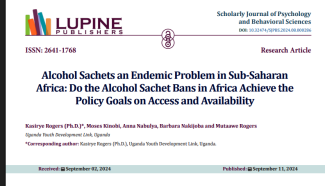Alcohol Sachets an Endemic Problem in Sub-Saharan Africa: Do the Alcohol Sachet Bans in Africa Achieve the Policy Goals on Access and Availability

Abstract Background:
Packaging alcohol in small quantities appears to be very popular in sub-Saharan African countries. This region represents itself amongst the largest consumer of easily accessible alcohol (WHO, 2018). Packaging and selling alcohol in sachets of certain amounts below 200 millilitres (mls) is common. There have been efforts by governments in the region to ban alcohol packed in small sachets (small quantities) during the period 2010-2022. Packing alcohol in sachets was making alcohol easily and widely available – causing alcohol-related problems. Sub-Saharan Africa has experienced high levels of alcohol poisoning and young people are turning to drinking (UYDEL 2012, 2014, 2022).
Method: Using desk reviews and web-based research for information, the study examined the methods and delivery of such directives that banned alcohol packaged in sachets in 10 selected sub-Saharan countries, their implementation and impact. We explored the legal regimes and social actors concerned with the bans.
Discussion: Over 10 African governments have banned alcohol packed in sachets. Information showed an increase in awareness about alcohol harm and a temporary drop in the drinking of alcohol. The ban led to a shift or migration from packing alcohol in polythene bags to packing it in plastic bottles (single use) with a minimum of 200mls. Lobbying and resistance by brewers in some countries delayed and violated the ban. The enforcement of the ban varied depending on who issued the ban, human resource, cooperation of the community and heightened awareness about the packaging of alcohol in sachets. The banning of minimal packaging of alcohol in sachets could be easily implemented with laws regarding weights and measures which provide a minimum standard and eliminate small amounts of certain products.
Conclusion: The intended benefits of the ban regarding accessibility, availability and acceptability appeared to work well in short term, more in the city as compared to rural areas. Availability and access in the long run are not affected as brewers used plastic bottles to pack same amount of alcohol and many relied on local brew. There is need to explore all means that help reduce the exposure of alcohol to young people buy eliminating small packaging in sachets, small plastic bottles and single-use plastic bottles.
https://lupinepublishers.com/psychology-behavioral-science-journal/pdf/SJPBS.MS.ID.000286.pdf